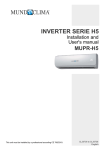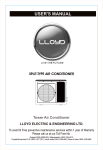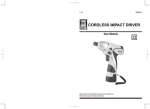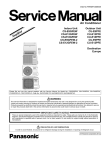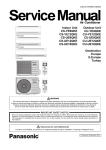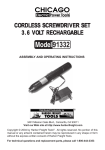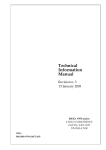Download Rinnai RINV70R-A Installation guide
Transcript
• Manufacturer’s Installation Instructions • Current AS/NZS 3000 •All applicable local rules and regulations including local OH&S requirements This system must be installed, commissioned and serviced by an Authorised Person. CONTENTS Safety Precautions 1 WEEE Warning 2 Name Of Each Part 3 Operation 4 Notices 5 Care and Maintenance 6 Troubleshooting 6 Installation Guide 8 Selection of installation location 9 Installation of the indoor unit 10 Installation of the outdoor unit 11 Pipe connection 12 Electrical connection 14 Commissioning 16 Packing list 16 Safety Precautions Incorrect operation due to ignoring instruction will cause harm or damage. The seriousness is classified by the following indications: WARNING This symbol indicates the possibility of death or serious injury. CAUTION This symbol indicates the possibility of injury or damage to properties only. WARNING The air conditioner must be earthed. Incomplete grounding may result in electric shock. Do not connect the earth wire to the gas pipeline, water pipeline, lightning rod, or telephone earth wire. , Don t pull on the power cord when removing the power plug. The damage of pulling power cord will cause serious electric shock. Minimum clearance of 1.0m to flammable gas or liquids. It may cause fire. The power plug must be inserted tightly. Otherwise, it can cause electric shock or overheating, even fire. , Don t put a finger, a rod or other object into the air outlet or inlet. As a fan is rotating at a high speed, it will cause injury. All repairs must only be carried out by authorised service persons. You may be hurt or cause further malfunctions. Stop operation and cut off the main power in storm or hurricane. Operation with windows opened may cause electric shock. Do not expose remote control or indoor unit to water, otherwise components could be damaged. g tnin Ligh , Don t touch the swinging wind vanes. It may trap your finger and damage the driving parts of the wind vanes. Isolate power at main switch when not using the appliance for a long period of time. , Don t pull out the power plug during operating or with wet hands. It can cause electric shock or fire. Cut off the power supply switch Danger , Don t share the socket with other electric appliance, and use the broken or nonstandard cord. Otherwise, it can cause electric shock even fire. Clean the dust on the plug regularly. Otherwise the dust mixed, humidity will result in insulation fault even fire. An earth leakage breaker with rated capacity must be installed to avoid possible electric shocks. Children should be supervised to ensure that they do not play with the appliance. This appliance is not intended for use by persons (including children) with reduced physical, sensory or mental capabilities, or lack of experience and knowledge, unless they have been given supervision or instruction concerning use of the appliance by a person responsible for their safety. When cleaning of the indoor unit case, simply wipe over with a damp rag. Do not use harsh cleaning products. -1- CAUTION , 1.Don t install the indoor unit in direct sunlight. , 2.Don t block air inlet or air outlet, otherwise, the cooling or heating capacity will be weakened, even cause system stop operating. 3.Don’t apply cold air to the body for a long time. It will deteriorate your physical conditions and cause health problems. 4.Close the windows and doors, otherwise, the cooling or heating capacity will be weakened. 5.If the air filter is dirty, the cooling or heating capacity will be weakened. Please clean the air filter regularly . 6.It is prohibited to stand or put things onto the top of the outdoor unit to avoid damage. In no case should children be allowed to sit on the outdoor unit. 7.Set a suitable temperature, especially if there are old people, children and patients in the room. Generally, keep the temperature difference for 5℃ between the inside and outside. 8.It is forbidden to use the air conditioner to keep precision instrumentation, artistic production for long time and make food fresh, otherwise abnormal use will cause damage. 9.It is forbidden to let children and the disabled use air-condition without other adult supervision. 10.Open windows frequently after using air-condition for a long time. 11. If the equipment emissions cannot meet the technical requirement of IEC 61000-3-3,Following Attention should be take care. Attention! Through poor conditions of the electrical MAINS, power supply voltage drops can appear when starting the EQUIPMENT. This can influence other equipment (eg. Blinking of a lamp). If the MAINS-IMPEDANCE Zmax< OHM(See attached nameplate), such disturbances are not expected. (In case of need, you may contact your local supply authority for further information). WEEE Warning Waste Electrical and Electronic Equipment: Do not dispose of electrical appliances as unsorted municipal waste, use separate collection facilities. Contact you local government for information regarding the collection systems available. If electrical appliances are disposed of in landfills or dumps, hazardous substances can leak into the groundwater and get into the food chain, damaging your health and well-being. -2 - Name of Each Part ★ Indoor Unit Air inlet 1 2 Indoor Unit 3 1、Front panel 2、Air filter 3、On/Off button Air outlet 4、Louver 5 4 5、Signal receiver 6 6、Supply cord (if installed) 7 7、Remote controller 8、Drain hose 9、Refrigerant gas/ ★ Outdoor Unit liquid pipe 9 Air inlet Outdoor Unit 10、Cut-off valve 11 8 11、Air outlet cover 10 Air outlet Note: 1.If the power supply (comes directly) from outdoor unit, you can find the power supply cord is fitted in the outdoor unit. 2. The descriptions in this user manual are(general and) text and figures may have slightly differences to the promotion information and actual appliance. Please refer to the appliance purchased . -3 - Operation ★ Remote controller operation See "air conditioner remote controller instruction " ★ Manual operation ☆ Manual operation When the remote controller does not work or can not be found, please follow these steps: 1.As the unit is operating, you can press the " Auto button " to stop operating. 2.As the unit is stopping, you can press the " Auto button " to start operating. ☆ Adjusting air flow direction 1. Adjusting h orizontal air flow manually. Use your hands to move the vertical airflow vane and change the horizontal wind direction. ! Note: a. Adjust the horizontal air flow direction before the air-conditioner starts. Don't insert your finger into air intake or outlet vents when the air-conditioner is operating. b. For appliance with auto pendulum wind function, please refer to "air conditioner remote controller instruction " for how to adjust horizontal air flow. 2. Adjusting vertical air flow direction(up-down) 3 Refer to " air conditioner remote controller instruction " for how to adjust vertical airflow direction through adjusting the horizontal airflow vane by remote controller. ! Note: Adjust the vertical air flow direction by remote controller. When you adjust the horizontal airflow vane by hand, the machine may cause problem. Manual operation can be used temporarily in case you can not use remote controller or its batteries are exhausted. When the air-conditioner stops, the horizontal wind vane will close the wind 8 outlet of air conditioner. -4- Notices To prevent injury and property damage, Please pay attention to these following before operating the air conditioner. ★ Checking before operation 1.Make sure that the earth wire is connected safely and reliably. 2. Make sure the filter net is properly fixed. 3. Make sure that air outlet and inlet are not blocked. 4. Please clean the filter before starting the air-conditioner referring to page to 6 " Cleaning " for how to operate. 5. Check to see whether the outdoor install bracket is damaged. If yes, please contact our Service center locally. ★ Safety tips In order to use the air conditioner properly, please refer to its working temperature range. Otherwise, indoor unit automatic protection function may be activated, cooling or heating efficiency will be weakened. , The table below indicates the normal operating temperatures >43℃(Apply to constant speed) Cooling Outdoor >47℃(Apply to variable speed) <18℃ Indoor >30℃ Outdoor <-7℃(Apply to constant speed) Heating <-12℃(Apply to variable speed) Indoor >30℃ The relevant Tbivalent and TOL values In standard EN 14825 are declared as follows: --for the average heating season Part load Ratio Outdoor air dry bulb(wet bulb) temperatures (℃) Indoor air dry bulb Temperature (℃) E TOL -10(-13) 20 F Tbivalent -6(-9) 20 -5- Care and Maintenance ★ Cleaning ☆ Cleaning the indoor unit 1.Turn off the air-conditioner and remove the electrical plug from the outlet. 2. Wipe the indoor unit with a moist (not dripping wet) cloth using warm mildly soapy water. ! Note : Don't use water above 45℃ to wash the panel, or it could cause deformation or depigment. Don ' t use thinner, polishing powder, benzene and other volatile chemicals. Don't use liquid or corrosive detergent clean the appliance and don t splash water or other liquid onto it , otherwise, it may damage the plastic components, even cause electric shock. ☆ Cleaning air filter Front panel Front panel Air filter Air filter 1.Raise up the front panel of indoor unit until it suddenly stop, then raise up the protruded part of air filter, and then take it out. 2. Use a vacuum cleaner or wash them with water, then dry it in the shade. 3. Reinsert the air filter into the indoor unit until being entirely fixed, then close the front panel. ★ Maintenance 1. Select " FAN " operation mode, make the air conditioner run a long time to dry. 2. Turn off the air conditioner and cut off the power supply. 3. Take out the batteries from the remote controller. 4. Clean air filters and other parts. Troubleshooting Check the following before requesting on service centre if the malfunction occurs. Phenomenon Air conditioner does not operate at all Trouble shooting Has the power been shut down? Is the wiring loose? Is the voltage higher than 1.1 times of max rated voltage or lower than 0.9 times of min rated voltage? Is the fuse burnt? Does it reach the set time for start up? -6- Troubleshooting Phenomenon Remote controller is not working Cooling (Heating)efficiency is not good Indoor unit does not operate immediately when the air conditioner is restarted Is the remote controller out of effective distance to the indoor unit? Is the battery flat? Are there any obstructions between the controller and the signal receptor? Is the setting temperature suitable? Is the air inlet or outlet obstructed? Is air filter dirty? Is indoor fan speed set at low speed? Is there any heat source in your room? Once the air conditioner is stopped, it will not operate in approximately 3 minutes to protect itself. There is unusual smell blowing from the outlet after operation is started. This is caused by the odour in the room permeated from building material, furniture, smoke, cleaning products or solvents. Sound of water flow can be heard during cooling operation This is caused by the refrigerant flowing inside the unit. Mist is emitted during cooling operation. Because the air of the room is cooled down rapidly by the cold wind and it looks like fog. Mist is emitted during heating operation. This is generated due to moisture in defrosting process. Low noise can be heard during operation A low hissing sound is caused by the refrigerant flowing. A low squeak sound is caused by the expansion and contraction of plastic due to temperature. In case the following situation, please immediately stop all operations and isolate the power supply, then contact the service centre . The fuse and switch trips repeatedly. Carelessly splash water or other liquids into air conditioner. Unusual noise can be heard during operation. Wind blowing from the outlet smells terrible during operation. The Run light or other display flashes rapidly and keeps flashing after electricity re-applied. -7- Installation Guide ★ Guide for customer 1.Please read the instructions carefully before installation of the air-conditioner. 2.The installation should be carried out by only authorised persons. 3.Installation the air-conditioner and connecting the pipes and wires must strictly follow the instructions 4.The wiring must be done by qualified electrician according to the electrical safety requirements. 5.The customer should have a qualified power supply which coincides with the tag of air conditioner, the normal voltage should be in the range of 90-110% of its rated voltage. 6.The air conditioner must be well grounded, the switch of the main power of airconditioner must be reliably grounded. 7. If your air conditioner is not fitted with a supply cord and a plug, a n all-pole switch must be installed in the fixed wiring in accordance with AS3000 and all local wiring regulations. 8. If your air conditioner is permanently connected to the fixed wiring and have a leakage current that may exceed 10 mA, leakage protector must be installed in the fixed wiring. 9.The power supply circuit should have leakage protector and switch of which the capacity should be more than 1.5 times of the maximum current. ★ Notices 1.The air conditioner must be installed on strong supports or surfaces. 2.The appliance shall be installed in accordance with national wiring regulations. 3.Fix the machine firmly, otherwise it will produce abnormal noise and vibration. , 4.Install the outdoor unit in the place where it wouldn t disturb your neighbour. 5.The method of connection of the appliance to the electrical supply and inter connection of separate components, please see the electric connection wiring diagram label on the machine. 6.If the power supply cord is damaged, it must be replaced by the manufacture or its service agent or a similar qualified person. 7.After installation, the isolation switch should be easily reached. -8- Selection of the installing position Indoor Unit ● There is no heating and steaming source nearby. ● No obstacles for installing position neatly. ● Keep good air circulation. ● Convenient to adopt measures to reduce noises. ● Do not install near doorways. ● Make sure to have the distance between the ceiling, wall, furniture and other obstacles. ● 2 meters high above the floor. ★ Above 15cm Above15cm Outdoor Unit ● In case that you put up a canopy to protect it from weather and sun exposure, pay attention not to restrict air flow through condenser coil. ● Do not place animals or plants near the installation location for the cold and hot air out will affect them. ● Make sure to keep the distance specified in the picture between ceiling, wall, furniture and other obstacles. ● Run the unit away from other heating sources and combustible gases. Above 30cm ● The installation base and supporting frame should be strong and secure. The machine cm 00 e2 ov should be on a flat and level surface. Ab Above 60cm ★ m 0c e1 ov Ab The distance between indoor and outdoor unit should be 5 meters and pipe length can go up to maximum 15 meters with additional refrigerant charge. Max. Allowable Tubing Length at Shipment(m) Limit of Tubing Length(m) Limit of Elevation Requires Amount of Additional Difference H(m) Refrigerant (g/m) CC≤12000Btu CC≥18000Btu 5 5 15 -9- 20 30 Installation of the indoor unit ●First make changes to wall and make sure that is hard and secure. Using four "+" type screws to fasten the installation board onto the wall. Use a spirit level to ensure both horizontal and vertical level to ensure proper operation and drainage of condensate tray and drain line. ●Pull out the indoor unit pipes after detached the fixed parts on them. Connect the interconnected pipes to the indoor unit: point to the center of pipe and fasten the connection screw at first by hand and then by wrench until you hear the " Click " sound. Fastening direction is shown in the right picture. Using torque is shown in the following table. Wall Indoor Outdoor Pipe connection 15mm Ring Connection pipe Nut pipe Spanner Putty 70 hole Drilling 70mm diameter pipe hole at the left down or right down side of the installation board. The hole shall slant outward slightly. Spanner Remove the base support foam in one side before installation. Wall Drain pipe Connection pipe Base Wall Air-conditioner Connection pipe Foam Plastic strap Cable Cable Connection pipe Outflow tube Cable Installation board Cable Outflow tube Installation board Note: The installed air-conditioner won't be tightly pressed to the wall if it is not arranged shown in the picture. The outflow tube must be in the bottom and the highest point of it can not exceed the position of water basin. ●Arrange the connection pipes, cable, outflow tube according to the figure , then connect the drain pipe to the draining hole. ●Use insulation sleeve to warp the position of connection pipe and indoor unit, then wrap the insulating tape on the sleeve to avoid condensate water. ●Fasten connection pipes, cables and drain pipe together by plastic strap. Connection wire Water discharge pipe - 10 - ●Hang the indoor unit to the board and make sure the machine is in the middle of the board. ●Pushing the machine towards the left down and right down side of the installation board until the hangers enters tightly the grooves (it makes " click " sound) ★ Check the water discharge 1. Take off the frame the unit cover. Take off the front frame for maintenance according to the following steps: ● Turn perpendicular airflow direction handle from " I " to horizontal direction. ● As shown in the picture on the right, take off two covers from the front frame and then unfasten two fixture screws. ● Pull the front frame towards yourself and take it off. In case that put the front frame back, turn the perpendicular airflow direction handle from " I " to horizontal, then proceed according to the third and the second steps. You should check whether the front frame is firmly inside the fixture groove on the top. 2. Check the water discharge. ● Put a cup of water into groove. ● Check whether the water flow through the water discharge hole. Bolt Vertical airflow direction plate Bolt Front frame Pull down the front frame towards your and take off the front frame. Installation of the outdoor unit ● The outdoor unit must be firmly fixed to avoid falling in the strong wind. ● Install on the cement base the drawing below. ● If it will be installed at seaside or at a place high above the ground and with strong wind, the AC should be installed against the wall to ensure the normal operation of the fan and the backing plate should be used. ● If it will be installed in type, the structure of the mounting surface should be made of solid steel, cement or materials with equivalent strength, and be of enough bearing capacity. Otherwise, measures such as reinforcement, support or vibration damping should be adopted. Fastening locations of outdoor unit A (mm) B (mm) 600X250X490 390 290 760X260X540 539 287 790X280X540 522 300 800X300X690(590) 540 326 900X330X860 606 354 967X380X805 535 353 Left installation feet Right installation feet Air inlet A B Outdoor Unit Size (mm) Air outlet Outdoor Unit - 11 - Pipe connection ● Connect the pipe to the unit: point to the center of pipe and fasten by wrench until it is tightly The size of pipe Torque fastened, the fastening _ 6.35mm( 14 ) 18N.m torque is in the _3 following picture. 9.52mm( 8 ) 42N.m _ 12.7mm( 12 ) _ Indoor unit Connection screw Pipe 55N.m 15.88mm( 85 ) 75N.m ● Pointing towards the center of pipe, fasten the screw with strength. ● Wrench the screw in the end until you hear the “Click” sound. Wrench Torque wrench Connection screw Outdoor unit Side liquid pipe Side air pipe Refer the direction to the picture ★ The form of pipe Use sealing tape to cover the small leaks on the external ring of the pipe Torque wrench Round shape Wrap up with tape Use sealing tape to cover the small leaks on the external ring of the pipe Pipes Water discharge pipe Connection wire Control panel cover Round shape Connection wire Round in this shape to prevent water entering the electrical parts ● Wrap up all pipe, water discharge and connection wire from top to below. ● Cover the connection and fix them with two plastic rings. ● Wrap up the pipes with tape alongside the wall and fix them to the wall with clips. These steps are usually adopted when outdoor unit is installed below the indoor unit. See the picture on the left ● In case that you want to have additional water discharge pipe, the end of pipe should be within certain distance towards surface ( Terminate drain below ground level, so it won ' t be swayed by the wind). ● Wrap the pipes and connection wire well from below to top. ● Wrap up the pipes that are rounded up by the wall comers in the way shown in the picture so it can prevent water entering the room. ● Use clips or other fixture to fasten the pipes to the walls. - 12 - ★ Expelling the air in the pipes and the indoor unit Expelling the air: humid air in the Outdoor unit refrigerating system might cause trouble of compressor. ● Take off the cover from the stop valve and T-branch valve. ● Take off the auxiliary cover from the T-branch valve. ● Turn the stop valve rod anti-clock wise to an angle of 90 degree, keep it open To indoor unit for 8 seconds and close the valve. Liquid side ● Check whether there is air leakage at Vapor side Gas side all connection parts of pipes. Stop valve(open) ● Push the top rod of T-branch valve by hexagon wrench to expel air. ● Repeat the third and fifth steps. Cover ● Open the stop and T-branch valve with a hexagon wrench to make the unit operate. ● There is no leakage allowed, please check all the piping connection parts. T-branch valve(open) You must test the leakage, generally, Auxiliary cover Hexagon wrench it can be tested by soap water. ● If the A/C is filled with R410a, make sure to discharge air and moisture remaining in the refrigerant system with a vacuum pump. (For method of using a manifold valve, refer to its operation manual.) 1.completely tighten the flare nuts, A, B, C, D, connect the manifold valve charge hose to a charge port of the low-pressure valve on the gas pipe side. 2.Connect the charge hose connection to the vacuum pump. 3.Fully open the handle Lo of the manifold valve. 4.Operate the vacuum pump to evacuate. After starting evacuation, slightly loose the flare mut of the Lo valve on the gas pipe side and check that the air is entering (Operation noise of the vacuum pump changes and a compound meter indicates 0 instead of minus.) Refrigerant Indoor 5.After the evacuation is complete, fully Outdoor unit unit A close the handle Lo of the manifold valve Gas side C and stop the operation of the vacuum Liquid side D pump. Make evacuation for 15 minutes or B Half union more and check that compound meter Packed valve 5 indicates -76cmHg(-1×10 Pa). Manifold valve 6.turn the stem of the packed valve B about Compound meter Pressure gauge 45 counterclockwise for 6~7 seconds -76cmHg after the gas coming out, then tighten the flare nut again. Make suer the pressure display in the pressure indicator is a little Handle Hi higher than the atmosphere pressure. Handle Lo Charge hose 7.Remove the charge hose from the Low Charge hose pressure charge hose. Vacuum pump 8.Fully open the packed valve stems B and A. 9.Securely tighten the cap of the packed valve. Low pressure valve - 13 - Electrical connection The connection cables should obey MDL this table: model ≤9000Btu (≤2500W) ≤12000Btu (≤3500W) ≤18000Btu (≤5100W) ≤24000Btu (≤7200W) Specification of connection cables (mm2) 1.0 1.5 1.5 2.5 ★ Indoor connection Open the front panel, inset the connection cables from the base of the air-conditioner, conneting to the terminal board in order (according to the graph), using the pressing board to fasten the connection cables. Wiring diagram of constant speed ≤12000Btu ≥24000Btu 18000Btu Front panel 1 2 4 5 1 4 2 5 N L 1 Bottom frame 2 3 4 5 N L Clip Connection cables Mid-frame Connection cables Wiring diagram of variable speed Front panel L N S Clip Bottom frame Mid-frame Connection cables Connection cables Open the front panel, if the indoor unit is fitted with the signal wire, please detach the mid-frame,and insert the signal wire through the bottom frame, then connect the signal wire quick plug of the indoor's to the outdoor's. ★ Outdoor connection ● Unscrew the screw, take off the control panel cover from the unit. ● According the connect position of indoor unit, make sure the connection cables connet to the board of outdoor unit corresponding. ● The grounded wire connection: 1.loosen the grounded screw of electric bracket. 2.Connect the grounded wire with the grounded screw then setscrew in the " " mark formerly. ● Fix the cable to the terminal board with clip. ● Reinstall the cover with the screw. - 14 - Wiring diagram of constant speed ≤5.2KW ≥7.0KW Cover 1 2 N Terminal board L Grounded wire Connection cables Grounded wire Electric bracket Cover Connection cables More than 5mm Terminal board Electric bracket Pressing board Wiring diagram of variable speed More than 5mm Terminal board 2 N Terminal board N L 1 Pressing board S S N L L Electric bracket Connection cables Connection cables Grounded wire Electric bracket Pressing board Pressing board NOTE: ※Connect the grounded wire correctly, otherwise will cause the malfunction of some electrical componet and shock or fire indeed. ※Don't reverse the power polarity. ※Must fix the screwnail of the firmly wire, then drag the wire lightly, confirmation whether it's firmly. ※If there is a connector, connect it directly. The connection of connection cables of indoor unit and outdoor unit must correspond (from the graph in down), otherwise, it could be cause shock or fire. Wiring diagram of constant speed Wiring diagram Heat pump Type Cold wind Type of variable speed 5.2KW ≤3.5KW ≤3.5KW ≥7.0KW ≥7.0KW 5.2KW Terminal board of indoor unit 1 2 4 5 1 2 4 5 1 2 4 5 1 2 4 5 N L 1 2 3 4 1 2 3 4 5 N L 5 1 2 1 2 1 2 1 2 N L 1 2 3 1 2 3 N L L N S L N S L N S L N S Terminal board of outdoor unit Brown= Live wire Blue= Zero line Yellow/Green= Grounded wire Note: Explanation for the power cord without plug (see below figure): NOTE: This manual is usually includes all the wiring mode for the different kind A/C, please refer to the corresponding guide and instruction when wiring. We cannot exclude the possibility that the product should be improved and caused the change of wiring, please refer to the wiring diagram adhered on the A/C purchased. - 15 - Test running ● Make sure that pipes and wires are connected. ● Make sure that liquid side valve and air side valve both are completely open. 1. The connection of power source ● Connect the wire to independent power source socket. ● Preparation of remote controller. ● Run the air-conditioner in cooling operation mode for 30 minutes or longer. Discharged air 2. Performance evaluation ● Test the out and in air temperature. ● Make sure whether the outlet air temperature subtract from inlet s gives more than 10℃ 。 Packing list ● Please check the following attach carefully, if part attach isn t useful, please take care of it. Packing list of the indoor unit NO. Name Unit Quantity 1 Indoor unit SET 1 2 Remote Controller PC 1 3 Remote wall bracket PC 1 4 AAA Battery PC 2 5 Energy Rating Label PC 1 6 User Manual PC 1 Packing list of the outdoor unit NO. Name Unit Quantity 1 Outdoor Unit SET 1 2 Vibration dampers PC 4 3 Brass Nuts(Large) ROLL 1 4 Brass Nuts(Small) ROLL 1 5 Installation Manual PC 1 6 Quick guide PACKET 1 - 16 -




















